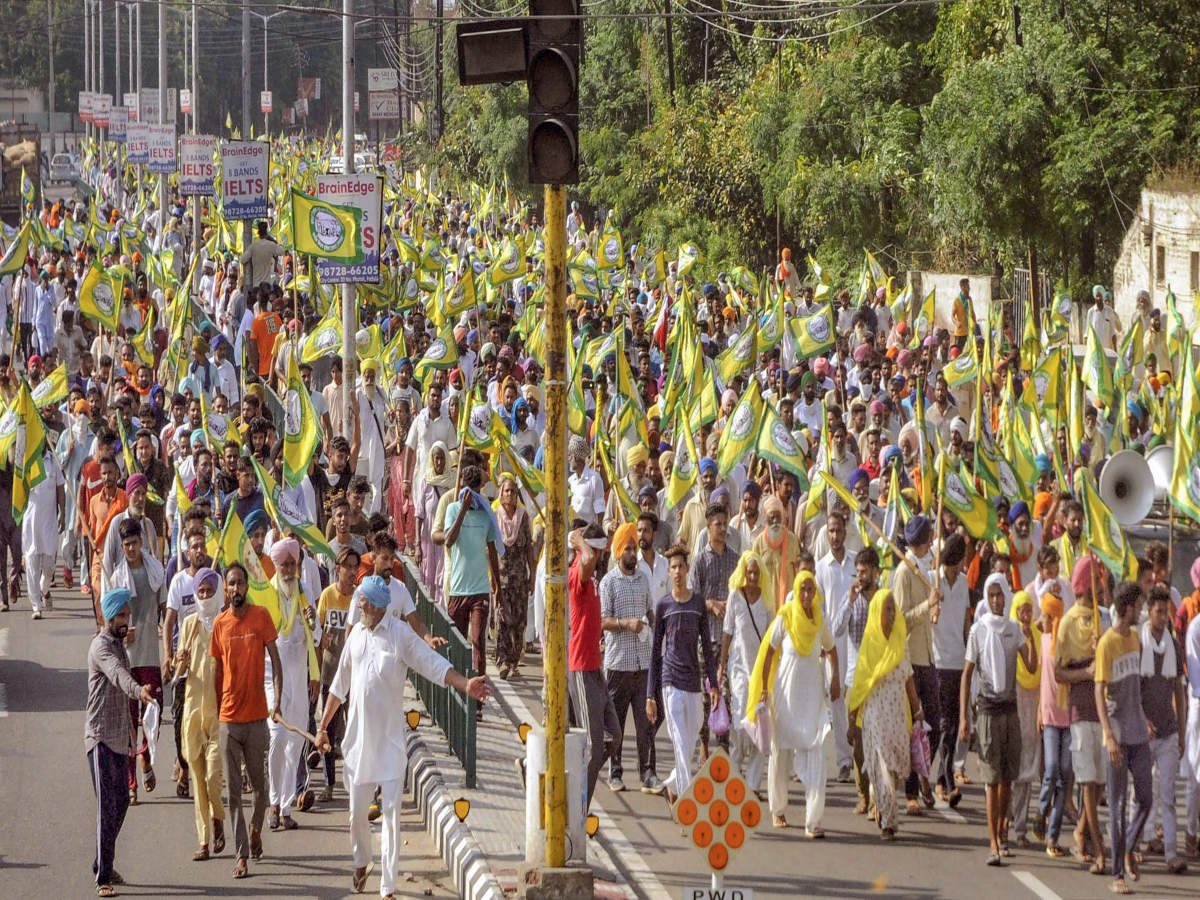Farmers and the government should move towards a system of direct cash transfer by ending MSP proving a loss deal

Picture Credits:Times of India
There is a need today that all the farmers organizations together with the government and all parties should prepare a roadmap for direct cash transfer from MSP. Due to excessive cultivation of a few crops due to MSP, Punjab has fallen victim to agricultural productivity.
[Abhinav Prakash]: Some farmer organizations opposing the new agricultural laws do not seem ready to accept anything of the government. In such a situation it becomes necessary to investigate how justified are the demands of these protesting farmers? One of the main demands of these demands is to give MSP a legal form. The emergence of MSP has its roots in the Green Revolution. Farmers then needed an incentive to increase production by adopting 'high yielding variety' of grains such as wheat and paddy to increase yields, seeds and techniques. The food policy adopted by India to tackle the shortage of food grains after independence had three goals. Production of food grains should be increased, adequate food grains should be stored at all times, better income of farmers and grains should be available at cheaper rates. However, these three aspects cannot be accommodated together. If the production of food grains increases, the prices will decrease and the income of the farmers will be adversely affected. At the same time, to protect the income of the farmers, artificially set higher prices of produce, then it will increase inflation, which will not fulfill the third goal. In fact, by artificially influencing prices through MSP, the emphasis will be on those crops which come under its perview.
Promoted content Amazon USA & Canada
MSP changed peasant society, capitalist peasant class emerged in Punjab
This is happening in Punjab in the form of wheat and paddy cultivation. In the sixth-seventh decade of the last century, the government focused on Punjab, Haryana and Western UP for the Green Revolution. Easy loans, cheap electricity, free water and cheap fertilizers etc. with the purchase on MSP in the government mandi were its important aspects. This policy not only succeeded in providing food security to India, but it also changed the farming society. Especially the capitalist peasant class emerged in Punjab. This class works instead of the traditional workers, with the use and economic benefits of the workers at the center. Contrary to popular belief, capitalism does not mean big industries and industrialists. Capitalism is determined by the relationship of production and not by the level of production. Capitalism is older than the Industrial Revolution and its origins are from the agro-capitalism and mercantilism of medieval Europe.
Promoted content Amazon India
Big farmers emerged in Punjab fearing new agricultural laws
These large farmers who emerged in Punjab were later established as traders of moneylending, rural trade and commerce and government mandis besides farming. His influence on the political front also increased. This class is afraid of the new agricultural laws, because its economic and social dominance lies in the continuation of the existing system. Along with government subsidies, monopoly and control of APMC, the MSP is the pillar of the status quo. They fear that liberalization in the agriculture sector may end this system as well as their domination. That is why this class of farmers is at the forefront in opposition to the new agricultural laws. Due to its socio-economic status, this section has also succeeded in mobilizing some farmers in its area of influence.
With the policies of the past, we cannot move towards the future
In the midst of this protest, we also have to consider that we cannot move towards the future with the help of past policies. The policy that was previously correct is not necessarily appropriate even today. 85% of the total farmers in India are small and marginal farmers. They also buy food grains. Apart from this, landless laborers constitute a large part of the rural population.
Food Corporation of India does not even have proper arrangements for keeping purchased grains
It is clear that higher MSP leads to inflation which affects all these classes. It also kills the urban poor. While a very small section of the rural area gets its benefit, because only few farmers get the benefit of MSP. Not only this, the assurance of higher prices from the market and purchase in government mandis gives these farmers an incentive to sow more wheat and paddy. As a result, the Food Corporation of India does not even have proper arrangements for keeping the purchased grains. Also, there is a heavy burden on the state exchequer.
Punjab, growing many crops, is now cultivating only wheat and paddy
Here, a fact has to be noted that the fields of Punjab which once used to grow many kinds of crops are today mainly covered with wheat and paddy. That too when this area is dry which is not suitable for paddy cultivation. Indiscriminate cultivation of paddy has ruined the water level here. The condition is that in the next few decades the entire region will be forced to face the scarcity of water and famine. On the other hand, burning poison paddy also causes pollution poison.
MSP guarantee leads farmers to grow wrong crops
After all, why is this happening? The answer is that the guarantee of minimum support price leads farmers to grow the wrong crop. In fact, in the era of shortage of MSP food grains, the policy was to encourage select crops and not the rights of farmers. The demand to make it legal is totally wrong and irresponsible. Government's job to get any private producer the desired price.





0 Comments